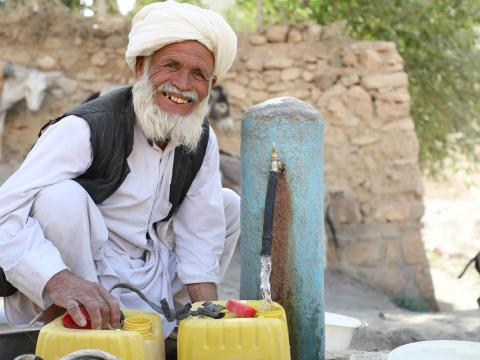Going back to school as water access is restored

Sakhidad, 55, lives in Badghis Province, where people experience regular water shortage and have no other option but to use unclean water even for drinking. Because of lack of access to clean water sources and drought, people living in villages fetch water from sources that are located very far from their homes.
Data from household surveys, conducted by World Vision, shows that only one in four households (25.5 %) use safe water sources, when the majority (74.5 %) use unsafe water sources. 84 % households reported that women and children are responsible for collecting water, which results in 29 % of children missing school to collect and fetch water, walking long distance. Collecting water from rivers, springs, and streams and relying on rain water reserved during rainy seasons, are the negative water shortage coping strategies in most parts of Afghanistan[1].
The water thus collected by the people most of the time is not safe and is not clean. “We were bringing our water from a valley which is one kilometer far from our house,” says Sakhidad. “Long distance walk till the water source was not the only reason of wasting our time. We were spending hours to wait for our turn because it was always a long line of people waiting to get water. We would spend five to six hours to fetch a pale of water every day.”
Fetching water in winter was even harder, people needed to face many challenges and dangers as if they were fighting a disaster.
Sakhidad has four children and most of the time his children were responsible for collecting water because he needed to work and earn bread for his family. Often he would hear complains from his children about the difficulties they were having while collecting water, but he could do nothing to make it easier for them.
“My children can go to school now, but most of the time they were missing classes because we needed water. The same was happening with children of our neighbours. We were relying on children on getting water and they needed to choose between their classes and getting water.”
After conducting a survey World Vision Afghanistan revealed that access to clean water was a priority not only for Sakhidad’s family but for the entire village; all were struggling to get water. The assessment showed that a clean water source could be built in the village and World Vision ensured communities had clean potable water.
“World Vision built a water container as well as water taps right in front of our houses. What else we could dream of? Now we are very comfortable and are very happy. I want to thank World Vision because they have done so much for us – they built a world for us and our children,” says Sakhidad.
Now Sahkidad, his sons and the neighbours shouldn’t walk long distances to fetch water. Sakhidad has time for working on the farm and his children have enough time to attend school. “It has changed our life because we used to spend many hours to collect water that was of poor quality. Now, I have enough time to work on my farm and everyone else has sufficient time to do their work. Everyone in the village, especially children and women, are very thankful for this support.
[1] World Vision Afghanistan’s need assessment survey conducted in four provinces of Afghanistan